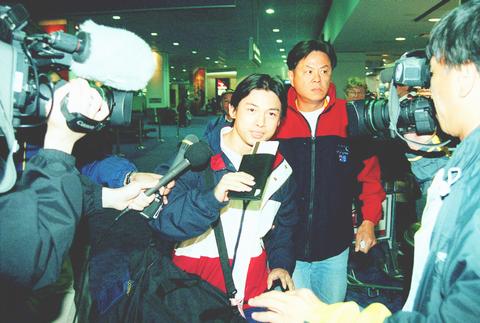Taiwan's Olympic team was dealt another serious blow yesterday when a third member of its weightlifting team was barred from competition, further dashing hopes that the island will bring home a gold for the first time in its history.
Yesterday, as hundreds of spectators were converging on Australia's port city of Sydney and the festive spirit of the Games was building, Chen Po-pu (陳柏甫), 23, was being ushered onto a plane and back to Taiwan.
Chang Chao-kuo (張朝國), the head of Taiwan's weightlifting federation, said after hearing of the ban: "I feel so ashamed. All our athletes will now be suspect and this will have a negative impact on the Taiwan team."

PHOTO: REUTERS
Speaking through a press release, Taiwan's Olympic delegation said that the International Weightlifting Federation (IWF) had requested that Chen, one of Taiwan's top three male competitors, be banned from competition for two years and barred from participating in the Sydney Olympics.
Chen is the third weightlifter from Taiwan to be barred from participating in the Olympics in a little over a week. On Sept. 5 Chen Jui-lien (陳瑞蓮) and Wu Mei-yi (吳美儀) were also barred from the Games.
All three weightlifters tested positive for muscle building and performance enhancing anabolic steroids.
Chen, who took silver and bronze medals at world junior competitions in 1997 and 1998, was on the reserve list to compete in the 62kg category in Sydney.
At a training session yesterday, a coach with the team said Chen's drug use was baffling since he was not scheduled to compete.
"He had no reason to take any drugs because he wasn't on the formal list of competitors. He was on the reserve list," said the coach, who declined to be identified.
Chen Po-pu first tested positive for steroids in March of this year after he set a new national record for the 63kg category, lifting 130kg in the snatch competition.
Chen said that he was using the drug for treatment of a shoulder injury, which doctors at Tzu Chi hospital in Hualien where he received the treatment have verified.
Chen's father, Chen Chi-jung (陳啟榮), also petitioned against the decision to Taiwan's Weightlifting Association arguing that the IWF standards say that athletes who are being treated for injury can refuse doping tests.
The elder Chen said that the amount of the drug in his son's system may have exceeded international standards, but the drug was not being used illegally.
Chen was barred at that time from competition until an Aug. 18 decision by Taiwan's weightlifting federation overturned a similar ruling against two gold-medal hopefuls, Chen Jui-lien and Wu Mei-yi, allowing them to join Taiwan's Olympic team.
With Chen and Wu allowed to compete, the ban against Chen Po-pu was also lifted on the grounds that the athletes were using the drugs for treatment, not to enhance performance.
However, Chen and Wu had also been found to have performance enhancing drugs that exceeded normal levels in their blood. Chen Jui-lien was using drugs to treat a chronic knee problem. In Wu's case, weightlifting officials have questioned the validity of the testing.
According to IWF regulations, countries who have three athletes found to be using banned performance-enhanced drugs will be fined US$50,000.

DAREDEVIL: Honnold said it had always been a dream of his to climb Taipei 101, while a Netflix producer said the skyscraper was ‘a real icon of this country’ US climber Alex Honnold yesterday took on Taiwan’s tallest building, becoming the first person to scale Taipei 101 without a rope, harness or safety net. Hundreds of spectators gathered at the base of the 101-story skyscraper to watch Honnold, 40, embark on his daredevil feat, which was also broadcast live on Netflix. Dressed in a red T-shirt and yellow custom-made climbing shoes, Honnold swiftly moved up the southeast face of the glass and steel building. At one point, he stepped onto a platform midway up to wave down at fans and onlookers who were taking photos. People watching from inside

MAKING WAVES: China’s maritime militia could become a nontraditional threat in war, clogging up shipping lanes to prevent US or Japanese intervention, a report said About 1,900 Chinese ships flying flags of convenience and fishing vessels that participated in China’s military exercises around Taiwan last month and in January last year have been listed for monitoring, Coast Guard Administration (CGA) Deputy Director-General Hsieh Ching-chin (謝慶欽) said yesterday. Following amendments to the Commercial Port Act (商港法) and the Law of Ships (船舶法) last month, the CGA can designate possible berthing areas or deny ports of call for vessels suspected of loitering around areas where undersea cables can be accessed, Oceans Affairs Council Minister Kuan Bi-ling (管碧玲) said. The list of suspected ships, originally 300, had risen to about

A Vietnamese migrant worker yesterday won NT$12 million (US$379,627) on a Lunar New Year scratch card in Kaohsiung as part of Taiwan Lottery Co’s (台灣彩券) “NT$12 Million Grand Fortune” (1200萬大吉利) game. The man was the first top-prize winner of the new game launched on Jan. 6 to mark the Lunar New Year. Three Vietnamese migrant workers visited a Taiwan Lottery shop on Xinyue Street in Kaohsiung’s Gangshan District (崗山), a store representative said. The player bought multiple tickets and, after winning nothing, held the final lottery ticket in one hand and rubbed the store’s statue of the Maitreya Buddha’s belly with the other,

Japan’s strategic alliance with the US would collapse if Tokyo were to turn away from a conflict in Taiwan, Japanese Prime Minister Sanae Takaichi said yesterday, but distanced herself from previous comments that suggested a possible military response in such an event. Takaichi expressed her latest views on a nationally broadcast TV program late on Monday, where an opposition party leader criticized her for igniting tensions with China with the earlier remarks. Ties between Japan and China have sunk to the worst level in years after Takaichi said in November that a hypothetical Chinese attack on Taiwan could bring about a Japanese